Text
fanghua, gift-giving.
we had to find out from yi-ge and shunxi's conversation in behind-the-scenes footage that li lianhua's fur cloak was a gift from fang duobing and last week, from iqiyi's graphics of props, that fang duobing's jade flute was a gift from li lianhua. what else is there about fanghua we’re not allowed to know about!
cheng yi: "[li lianhua] is rich for once! finally, it's his turn to be rich! yet, it was thanks to someone else 😂 (to zeng shunxi) this fur cloak is yours, you know that? you can't even bear to wear it yourself. you gave it to me."
the fur cloak that makes xiaohua look like a polar bear was a gift from xiaobao after all:





importantly, this is the fur cloak xiaohua carries with him to the very end.


personally, i see both xiaohua and xiaobao as incredibly and admirably well-adjusted individuals i aspire to be. together, their relationship is less about the "redeeming each other" trope. to me, fanghua is more like, xiaohua met someone who brings an extra layer of warmth to his skin, until one day he realizes he is here for good, like a blanket he never wants to return. we get this personified in xiaobao's fur cloak xiaohua keeps to the end despite letting go of all other mortal possessions on the beach, how wonderful is that.
李蓮花贈與方多病的玉笛 (the jade flute li lianhua gifted fang duobing).


xiaobao's jade flute he carries with him at his waist being a gift from xiaohua feels so much like the classic 定情信物 (token of love) and breakup trope 😭


personally, i love both options whether the jade flute is xiaobao's own or if it was a gift from xiaohua. before, i was thinking the jade flute as a personal item of xiaobao's could be a symbol of his free nature, in that yes, he's entering the jianghu to be a formal detective who (truly) embodies li xiangyi's ideals, but he also would enjoy a carefree life endlessly travelling with li lianhua. so, breaking that in tears in their big fight could represent him trying to be firm on returning to the detective route and wondering if he was so naive enough to give his heart out to someone and picturing settling down into a quiet life with that person (before they make up).
but now, as a gift from xiaohua, it's completely that classic 定情信物. it re-frames the first little break-up in such an amusing way. they "break up," and xiaobao goes off flaunting the gift xiaohua gave him and touches it to his skin in front of everyone, like he's waiting for xiaohua to admit he still cares about him. because what was that jade flute gift if not proof that he saw him as a close companion? 😤

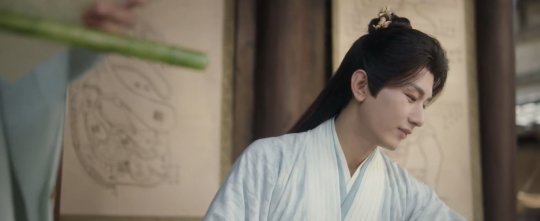
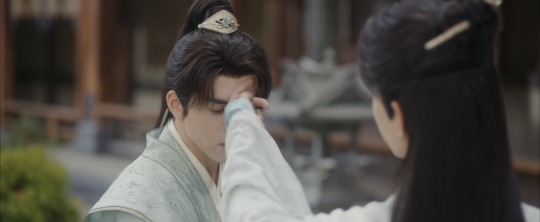

from xiaohua's smiles and clearly showing interest in xiaobao's antics, he knows exactly what xiaobao is doing 😂
isn't it also such a nostalgic, amusing, and charming little classic story to have a rich young master who has a lot of money of his own he can spend with a wave of a hand but walks around everywhere with a small gift he holds close more than anything because it’s from someone he likes? with both the showing off and carrying it everywhere he goes, truly — xiaohua knows exactly what xiaobao has been doing.

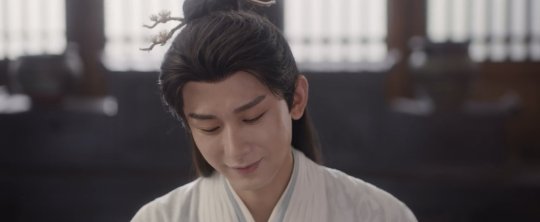
#also that makes it extra funny that the other time we see him use that flute to do anything (prior to breaking it)#is in the post ep-16 pseudo break up when he uses the flute to fend off guan hemeng's needles#using a gift to do something like that#just shows the spite doesnt it#xiaobao WHY#>>>PREV TAGS SJJDJFJFKKEKE#XIAOBAO XIAOBAOOOOO#< prev tags#< prev prev tags#XIAOBAO. XIAOBAO NO#fanghua#li lianhua#fang duobing#mlc#mysterious lotus casebook#lian hua lou#reblog
60 notes
·
View notes
Text
Me doodling away. I have no excuse for this except that I think that there is a soft core in Di Feisheng and that he loves Li Lianhua...stubbornly.
Song: Hungriges Herz (Scala & Kolacny cover)
55 notes
·
View notes
Text
honestly i dont need therapy i need a machine to go into my body and manually stretch all my muscles and crack all my joints and then i need the machine to go into my brain and deep clean it with soapy hot water
56K notes
·
View notes
Text


It's easy to think you'd be able to do something when you know that you'd never have to actually do it.
17K notes
·
View notes
Text
笛花 prompt fill for @kingsandbastardz
The groupchat had a burst of inspiration from @lyselkatz's post-canon fanart of silver-haired Li Lianhua and bearded A-Fei, and wanted to play around a little.
[Being officially dead doesn't mean they no longer solve problems. Dead bodies keep appearing with distressing regularity.]
-----
Normally, a dead body found in the streets of Jia Town isn't their problem. But three bodies scattered in different places in one night? Even Li Lianhua's old fox ears begin to twitch as the news breezes through the morning market bustle.
“Don't,” Di Feisheng warns, as his husband stops to inspect some radishes being sold by Sun Erniang and ever so casually inquires about the strange nature of the injuries found on all three corpses.
She claims she doesn't know much, but the excruciating detail with which she is able to describe the blood which was seeping from the corpses’ eyes, nose, and ears, and the bloom of black bruising on their necks when they were discovered, means that the farm wife rumor mill has been hard at work.
After he's wrung out every last scrap of detail that Sun Erniang knows—for her neighbor's cousin’s brother-in-law works at the local yamen—Li Lianhua turns and deposits an armful of radish and cabbage in the woven basket Di Feisheng is holding. The farmer has been well-rewarded for her information, he observes.
Li Lianhua turns, bidding her a good day. He cozies up to Di Feisheng, relieving him of the basket and uses the excuse of steering him through the crowd to hang off his arm so they can convene in low tones.
“So, A-Fei,” says Li Lianhua lightly. “Do you think this is the Qiankun Wudu Shou 乾坤五毒手 or the Tiangang Xuanwu Zhi 天罡玄武指?”
Di Feisheng strokes his beard thoughtfully. Since his retirement from Jianghu ten years ago, between the travels, the sunsets, and the chores to do around Lotus Tower, he's managed to amass quite the collection of esoteric martial arts tomes. Between the two of them, there's not a single technique that can escape their discerning eye, but that doesn't mean that the old fox should be poking his snout where it doesn't belong. If the Emperor ever gets word that Li Lianhua yet lives…well, Di Feisheng doesn't need to remind his husband of how suddenly the quiet life they've managed to lead will come to a juddering halt.
“I'd have to see the bodies myself to know for sure,” Di Feisheng hears himself saying, even though he knows where this is going to lead.
“Exactly what I was thinking,” Li Lianhua agrees, with a mischievous grin playing about the corners of his mouth. “The yamen is that way,” he says, nudging Di Feisheng to turn right down the next street.
“Don't worry,” Li Lianhua continues, before Di Feisheng can even open his mouth to voice his concern. “Sun Erniang’s neighbor’s cousin's brother-in-law works there. They won't tattle on us.”
Di Feisheng merely grunts, and lets his husband lead him onto the next mystery. It's only been a week since the last one. He begins to wonder whether they are somehow cursed, or if his husband is just terrible at minding his own business. Perhaps it's a bit of both.
#lmaoooooo#llh's fox nose is only attuned to trouble#mysterious lotus casebook#mlc#lian hua lou#di feisheng#li lianhua#feihua#fanfiction#reblog
26 notes
·
View notes
Text
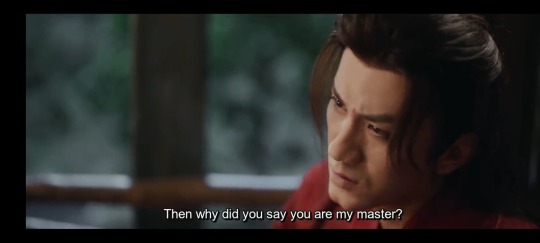
the kink got out of hand, sorry
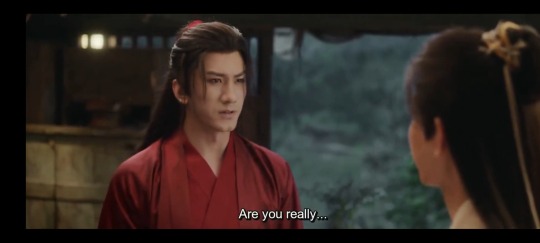

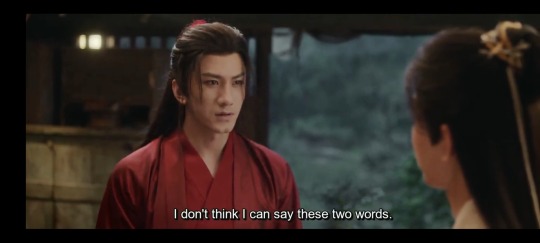
then what ARE the words you want to say

I can't believe they really went with "antagonist gets amnesia, vaguely recognises the protagonist and decides that they are besties actually" trope
102 notes
·
View notes
Text
delighted by the discovery of the concept of "doomed by the narrative but your friends are punching the narrative in the face and you're fine now"
#always reblog fucking watch me fdb#< prev tags#yes prev#mysterious lotus casebook#mlc#lian hua lou#reblog#gif#li lianhua#fang duobing#fanghua
31K notes
·
View notes
Text
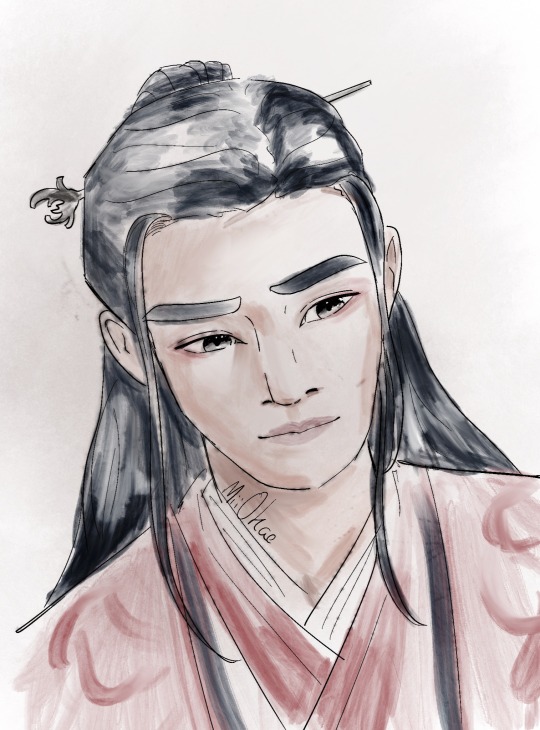
Testing out watercolor styles of rendering with wen kexing 🫠
25 notes
·
View notes
Text
You cannot live alone on the fantasies you feed to your mind, eventually you have to touch your life for real, assess and analyze your habits, understand your character, try not to hate yourself for your character as it was shaped when you were very young by circumstances outside of you, and begin learning how to cope with your character, how to build habits that work for you, finish small projects, finish big projects, expose yourself to more uncomfortable situations, assess why you want to leave that friendship before you leave it, raise your anxiety levels on purpose, so that you can grow, raise your work load on purpose, so that you can grow, so that you can build resilience, so that your life expands, and can be experienced by you in full and in reality
128K notes
·
View notes
Text
A Jianghu Mystery of the Middle Xi: The Tomb of Li Xiangyi
By Qiling, University of □□ (2024)

Left: A photograph of the inscribed text at Li Xiangyi's tomb, reading, "The grave of the Sigu Sect's departed Sect Leader, Li Xiangyi". Right: Artist's sketch renditions from eye-level frontal and aerial side views, recreating how the tomb may have appeared during the Xi dynasty.
Among the numerous important archaeological finds from the Xi Dynasty, the tomb of Li Xiangyi is not the most well-known, nor has it yielded any artifacts of particular intrigue, yet it has raised questions about certain points in history since its discovery. The tomb constitutes a small site, near a mountainous overlook which should have received little common traffic at the time of construction. Its structure is in line with some other aristocratic burials of the Middle Xi period: aboveground, with a chamber at the center of a raised rectangular dais several meters wide, large enough to bear only a single individual. A stone marker, which has survived in legible condition until today, declares it the tomb of Li Xiangyi, leader of the Sigu jianghu sect.
Records about Li Xiangyi are found at other archaeological sites contemporary with this tomb, and so his name is not an obscure one. The Sigu Sect complex has already undergone excavation for nearly two decades, with evidence that Li Xiangyi spent several years there as its first sect leader and founder. His tomb is within two hours' walking distance of the Sigu site, though isolated in its location, compared to the Sigu Sect's grand mountain entrance. (The complex itself was inhabited well after his death; bamboo slips cite Qiao Wanmian as the Sigu Sect's next major leader some years after, who oversaw it for several more decades into the later Xi). In addition, the Baichuan-Pudu site, closer to the eastern coast and historically the headquarters for the Baichuan Court, is affiliated with Li Xiangyi. Its origins apparently began as an offshoot of the Sigu Sect, which grew into its own independent legal organization after his death.
Legends surrounding Li Xiangyi's life have been well-documented, both at Sigu and Baichuan-Pudu, but also in books and transcriptions of oral stories at sites around the country. These are dated to both the Middle and Late Xi periods, as well as a few scattered mentions in writings from the following dynasty. As a jianghu sect leader and swordsman, Li Xiangyi's reputation truly preceded him. Some tales speak of his early accomplishments, ridding towns of villainous tyrants and defeating criminals. Others talk about the founding of the Sigu Sect when Li Xiangyi was seventeen, and his subsequent missions leading his fellow swordsmen to protect the borders of the country. Not all of these narratives can be verified with surviving historical proof, and given Li Xiangyi's status in the shifting canon of folklore, the percentage that are hyperbole or fiction is likely significant. However, one that is true, and is the most frequently told story throughout these sources, is that of Li Xiangyi's death.
All texts place Li Xiangyi as having died relatively young, with some providing a specified age, generally around twenty. He perished in a duel with Di Feisheng, leader of the Jinyuan Alliance, a rival jianghu organization and presumed threat to the Sigu Sect. As the sources say, the Jinyuan Alliance killed Li Xiangyi's sect brother, Shan Gudao, and in retaliation he used the Sigu Sect to launch a war against the Jinyuan Alliance. His final battle was the last in this war, dying in the East Sea on Di Feisheng's ship. The Jinyuan Alliance in return was badly defeated by the Sigu Sect; excavations at its first compound in the last five years have shown evidence of siege, with fire having destroyed large parts of the buildings. Afterward, the Sigu Sect disbanded without Li Xiangyi, with only the Baichuan Court continuing to function, before being resurrected one decade later.
Given this knowledge we have about Li Xiangyi, the matter of his burial should be straightforward. He had a tremendous impact on the jianghu in the few short years that he stood at its peak. He died heroically, if tragically, to obtain justice for a brother. He was honoured with a tomb, standing guard over the sect he dedicated his youth to. Why, then, is said tomb regarded as somewhat of a mystery?
This tomb was first stumbled upon during extended surveys of the Sigu site territory, with excavation taking place within the last two years. Parts of the stone chamber and foundation of the dais have withstood time, as have most things left inside. The tomb bears no signs of looting. However, there are some details which, alongside discoveries from other archaeological sites, contribute to a shadow of uncertainty on the existing narrative of Li Xiangyi's life.
Firstly, is that the austerity of the tomb does not line up with what we know of Li Xiangyi. Although overall sufficient enough for someone of his great reputation, the tomb is rather plainly embellished. There are an unexpectedly small number of burial objects inside, with those present being neither rare nor expensive. For all his contributions to the jianghu, less money and resources were poured into remembrance of Li Xiangyi than seems proper for his time.
Secondly, and far more significantly, is that the tomb holds no human remains. Whether the fact of Li Xiangyi having no recovered body to bury was made public is unknown; if it was, we do not have record of it. Certainly those who arranged for the tomb to be built and sealed would have carried this with them the rest of their lives, but no one else may be accounted for. Granted, it is not impossible for a disappeared body to have been common knowledge or presumption, as Li Xiangyi was killed at sea with no guarantee of being found. Yet this, combined with the ordinary appearance of the tomb, causes the entire site to appear... a nominal thing. Constructed to maintain acknowledgement of Li Xiangyi's absence, though his death was only marked by words, rather than a physical state.
He was given a tomb, but was Li Xiangyi truly dead before it was built?
In terms of the aforementioned other archaeological site findings, there is one that potentially implicates Li Xiangyi's death at an interesting political junction, within the context of the dynasty. The Xi Dynasty was unstable and relatively short-lived, established after taking back the Central Plains and adjacent territories from the southern conquering state of Nanyin. It endured for just under two centuries, the first of which was fraught with pockets of conflict, with many jianghu skirmishes such as that between the Sigu Sect and the Jinyuan Alliance. The greatest threat to the Xi Dynasty (until its fall) came one hundred years after its founding. Recovered archival records from the Xi capital excavation report that remaining Nanyin loyalists attempted a coup, supported by jianghu organizations, including a restored Jinyuan Alliance (although whether Di Feisheng was still its leader at this time is unclear). This attack was ultimately unsuccessful, but important to note is that the leader of this renewed Nanyin force is described as being Shan Gudao, Li Xiangyi's former sect brother.
Although Li Xiangyi brought the Sigu Sect into a war upon news of Shan Gudao's death, that demise seems to have been faked, with Shan Gudao disappearing underground only to reappear as part of a later rebellion. Could Li Xiangyi have been aware of this? Was his reaction to Shan Gudao's apparent death genuine? Or part of a coordinated plan, using him as a reason to destroy the Jinyuan Alliance to eradicate any future resistance? Did Li Xiangyi, too, fake his death alongside Shan Gudao, in service of a shared cause? Were remnants of the Sigu Sect instructed to build an empty tomb, cementing Li Xiangyi as a dead hero so he could work in the shadows of the jianghu instead?
This is merely speculation, contradicted by the fact that if Li Xiangyi had indeed done as such, unlike Shan Gudao, after his duel with Di Feisheng he has no reappearance in any surviving records or at any archaeological site. As well, Li Xiangyi should have had no motivation for committing to such a scheme, with even loyalty to Shan Gudao a stretch to putting all the lives of the Sigu Sect on the line. That being said, history has a way of surprising the present, and this theory may not be entirely ruled out. At any rate, Shan Gudao's survival is a baffling accompaniment to Li Xiangyi's (lack of a) burial, one which will hopefully receive clarifying answers in future archaeological developments.
Perhaps the strangest piece of the puzzle concerning the end of Li Xiangyi's life, however, is Di Feisheng. After the Jinyuan Alliance was scattered by the Sigu Sect, stories regarding Li Xiangyi declared him dead and disappeared. Yet not unlike Shan Gudao, he became known in the jianghu once more about ten years later, witnessing the Nanyin attempted coup and living long after. His tomb remained intact, and was excavated eight years ago as part of the greater Tianji Mountain site project. The location of Di Feisheng's tomb is surprising, not only because it directly links him to the powerful and wealthy He clan of Tianji Manor, but also because he was buried beside their sole young master during the Xi Dynasty, Fang Duobing.
The son of financial minister Fang Zeshi and engineering master He Xiaohui, Fang Duobing became a notable youxia travelling the jianghu in the emperor's name, assigned in the wake of the attempted Nanyin coup. According to palace records, he was also betrothed to the Princess Zhaoling, although the marriage agreement was eventually formally dissolved. What is otherwise known of Fang Duobing was his admiration of Li Xiangyi, having styled himself as a follower and disciple of him during his youth. As well, one eye-catching artifact among Fang Duobing's burial goods was a preserved wooden replica of a blade, with Li Xiangyi's name carved near the hilt. Likely a children's toy, prized and kept safe throughout Fang Duobing's life.
The exact nature of the relationship between Di Feisheng and Fang Duobing is not entirely certain, but it must have been a very close one, for Di Feisheng to have the privilege of burial on the Tianji estate. This topic justifies future study for our understanding of the Tianji He clan, already known in prior generations for its socially subversive relationships, but pertinent to Li Xiangyi is that the man whose most infamous act was to kill him, was laid to rest next to one who revered him. Why was there such a bond between these two figures, if the stories of Li Xiangyi's death have had any truth to them? Did Li Xiangyi really die by Di Feisheng's blade? Did Li Xiangyi's empty tomb, plausibly signifying Di Feisheng's innocence, alter his relationship with Fang Duobing? Or indeed, did Li Xiangyi, the man himself, have a part to play in this?
No traces of him from this time remain in the archaeological record, true. But this should not be taken to mean without doubt that he was not alive then at all.
The discovery of Li Xiangyi's tomb has been an exciting development for studying this era of the Xi Dynasty, but it has also outlined doubt in areas of one man's life that were previously taken as likely facts. Li Xiangyi's tomb is scarcely fitting for his name as a founding sect leader, built more for the sake of its existence than anything else, and there was no body sealed inside to begin with. In addition, Shan Gudao— someone dear to Li Xiangyi— established a precedent of faking his death. Di Feisheng, known across the jianghu for killing the man, held a close bond with someone later in life who had personally looked up to Li Xiangyi, and so he may not have been fully responsible for Li Xiangyi's death to begin with.
What truly happened to Li Xiangyi, resulting in a tomb such as this? The past holds the answer, knowing things that we do not. Hopefully the future of archaeology will continue leading to new discoveries, and allow us to more completely understand the legend that was Li Xiangyi.
#op i CANNOT cry in public#same feeling as that post about the three different graves side by side all constructed at different times#mysteries lotus casebook#mlc#lian hua lou#li xiangyi#di feisheng#fang duobing#reblog#reference
83 notes
·
View notes
Text
#oh ocean waves crashing on my chest we really in it now#< prev tags#prev same hat#nothing beats that feeling#nap in a sunbeam is good but.#it's too. hmm. gentle?#the ocean loves and her love destroys#reblog#tumblr polls#reference
818 notes
·
View notes
Text
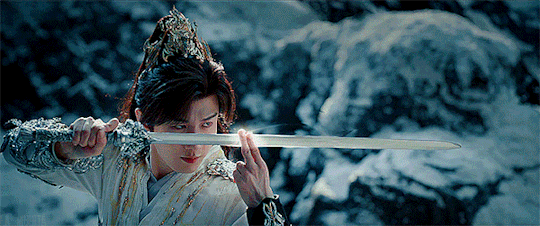
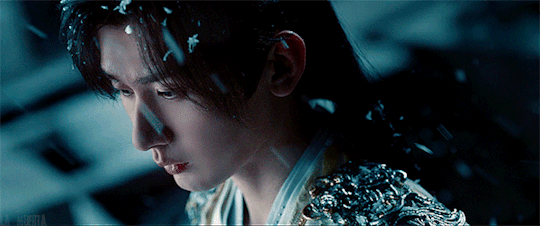

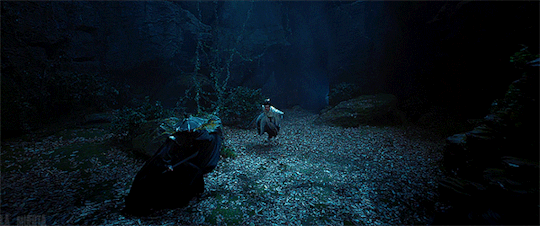

成毅 Cheng Yi as 王权富贵 Wangquan Fugui in the teaser trailer for 《狐妖小红娘 · 王权篇 (Fox Spirit Matchmaker · Wangquan Chapter)》
321 notes
·
View notes
Text
how?? just how?
40K notes
·
View notes
Text





Just a reminder about fatphotoref.com—it exists!! I'll be updating with new photos next week and hopefully more regularly after that. Request access by going to bit.ly/fpraccess 💙🧜♀️ happy mer may!
33K notes
·
View notes
Text
hello character who is desperate to be a good person; i want to play a game. in front of you is the one person you will never be able to save. you have the rest of your life to make peace with this. there are no defined repercussions if you fail, but we both know you're going to attempt to win regardless. your time starts now
17K notes
·
View notes

